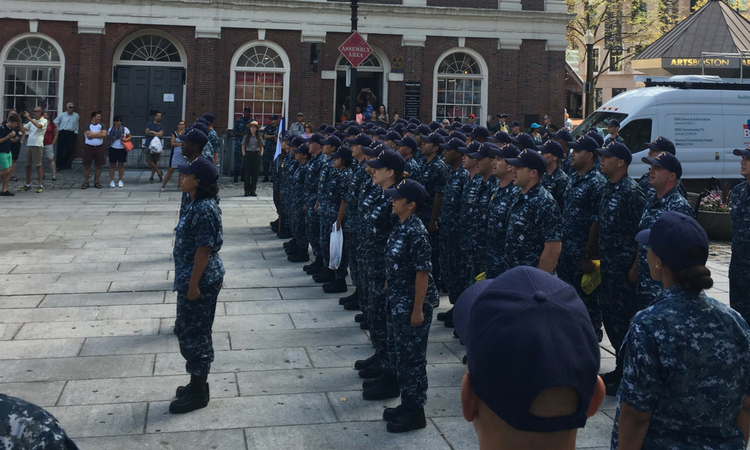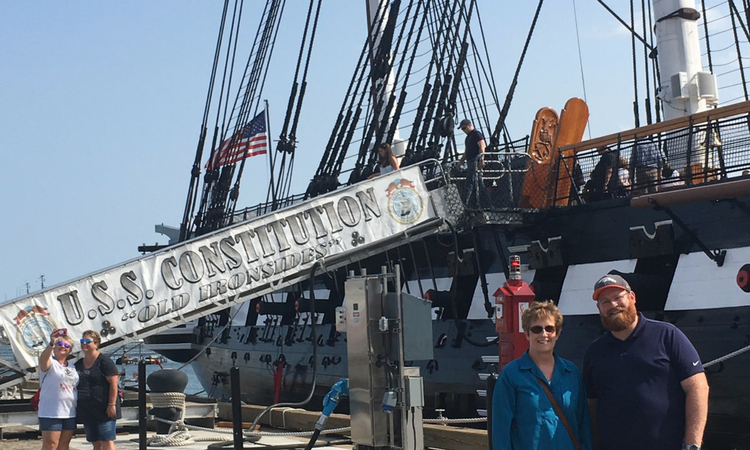 We were recently on a family vacation in Cape Cod. And when I say family, I mean family. There were 10 of us in a house we rented a few blocks from the beach. A lot of togetherness. But we still had a great time-although when it came time to leave, I was ready.
We were recently on a family vacation in Cape Cod. And when I say family, I mean family. There were 10 of us in a house we rented a few blocks from the beach. A lot of togetherness. But we still had a great time-although when it came time to leave, I was ready.
Marleen and I had flown into Boston a few days ahead of the rest of the crew to take in some of the city’s sights. One of the things we did was walk most of the Freedom Trail; a sidewalk tour that takes you past many of the locations where key events that led to our break with the Mother Country occurred. Well worth doing next time you’re there.
An unexpected bonus along the way was to witness snatches of the advancement ceremonies for an incoming class of Navy chief petty officers. At intervals, we would see men and women in uniform, sometimes in formation belting out a spirited rendition of Anchors Aweigh, sometimes lounging around waiting to move on to their next rally point.
Prominent in the news when we were in Boston was the most recent of the four sleek Navy ships that have been involved in collisions with lumbering commercial vessels. And which have resulted in the deaths of numerous sailors since the first of this year. The latest incident, involving the destroyer the John S. McCain, resulted in the Navy ordering an “operational pause” for the entire U.S. fleet of 277 vessels to review safety procedures.

I ruminated on this alarming record during our remaining days in Boston, which included a visit to “Old Ironsides.” Officially known as the USS Constitution, the beautiful three master looked her best, having just come out of dry dock following a two year restoration. By then, our son, Byron, had joined us as we toured the ship. Byron is our “Navy guy,” having served with distinction during his eight year career helping to run the reactor aboard the ballistic missile submarine, the USS Nebraska.
By the time we got to the beach on Cape Cod, we were joined by our son-in-law, Haden, who is the family’s “Marine guy.” He did two tours in Iraq; the second was agonizing for our daughter, Lauren, who was all but engaged to him during his deployment. “All but” because Haden is the kind of guy you would want your daughter to marry; he called and asked my permission when he got home.
At one point on Cape Cod, when the three of us were together, I asked Byron about the Navy chief advancement ceremonies Marleen and I had seen. “I don’t know a whole lot about them,” he answered, “but given that they were going around seeing the sights in Boston, I expect that they have something to do with naval heritage indoctrination.”
“I’m sure,” I continued, taking the conversation in a different direction, “that you guys have seen the news about all Navy vessels that can’t seem to keep track of where they’re going and run into merchant ships. I’m thinking of writing a post on my blog and calling it ‘The Gang That Can’t Shoot Straight.'”
“I wouldn’t do that,” said Haden. “With all the wars and deployments the military is stretched pretty thin. I wouldn’t want to be in the military right now.”
I could have guessed what Byron would say: “I agree.” By the time his commitment was up, he couldn’t wait to get out. In addition to the frustrations of military bureaucracy, exhausting, long watches were a way of life, even in the reactor space.
But despite their qualms, I decided to go ahead. If the news stories are right about the military being overextended, and I don’t doubt they are, shouldn’t it be talked about? Especially since, as it so obviously is, a life and death issue?
And, yes, the title of this post may be irreverent. But is it inaccurate? Despite spending trillions of dollars, has the U.S. military been on the winning side of a major conflict since WWII? You decide. Korea? Seventy years on and it’s threatening to explode into an unprecedented calamity. Vietnam? You’re kidding. Grenada? I said “major.” The Cold War? Perhaps. Unless we “succeed” in provoking Russia, a nation with a vast nuclear arsenal, into a shooting war. As so many of our warmonger Washington politicians seem to want. Afghanistan and Iraq? Out and out disasters.
Dwight Eisenhauer, President and Supreme Commander of Allied forces in the last major war we won, warned the nation in his farewell address of what he called the “military industrial complex.” It’s an iron triangle of defense contractors looking for lucrative arms deals, Congressmen who want to bring home pork barrel projects for their districts, and a top heavy military bureaucracy out to aggrandize itself. In 2015, the U.S. spent more on the military than the next seven nations combined.
Judging, in short, by this record, the U.S. military seems better at spending money-than winning wars. Perhaps not too surprising. Since when did “complexes,” rather than armies, win wars?
When we got home, I discussed the Navy’s problems again with a friend who, over the years, has repeatedly astonished me with the depth and breath of his knowledge; he may be the closest thing to a polymath that I know.
“You know,” he said, “there is another problem in the Navy that’s been largely buried. It’s not just that tired sailors are falling asleep when they should be standing watch. There’s a lot of sleeping around since Obama mandated that the Navy go coed. Pregnancies are way up. That means ships are short handed. And,” he continued, “it’s a politically incorrect thought crime to even notice it. Obama did his best to deep six the story.”
– – – – – – – – – – – –
I attend a men’s Bible study most Wednesday mornings. We’re currently making our way through the books of Samuel in the Old Testament. A central figure is King David; one of the episodes in the book, known to most school children, is that of David and Goliath.
Our gifted teacher, Rich Pilon, (a Navy vet, by the way) has said repeatedly that a central theme of the story is, “Leadership matters.” There are abundant examples in the book of the disastrous consequences of poor leadership at the highest levels: corrupt priests whose selfish miscalculations result in slaughter and national humiliation. Lustful kings, including David himself, whose misdeeds shatter families and nations.
The problems in our military aren’t, for the most part, caused by the Navy chiefs that Marleen and I saw along the Freedom Trail in Boston. Like so many others in our all volunteer force, they are no more than cogs in the wheels of a dysfunctional military Borg.
Our political leaders too often see these sailors as tools to allow them to brag to the folks back home about all the jobs they’ve brought to the district. And use them as petri dishes to try out misguided social experiments in the cause of political correctness. And then abuse them by entangling our nation in endless, futile wars at a terrible cost to our soldiers and their families.
Defense contractors and lobbyists look on them as little more than a justification for their fat, steady paychecks.
And our top heavy military brass? Well, I won’t say it.



